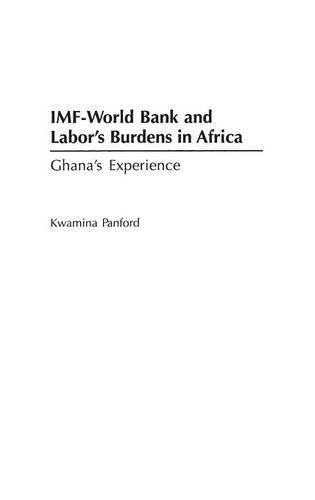
IMF - World Bank and Labor's Burdens in Africa: Ghana's Experience
(Hardback)
Publishing Details
IMF - World Bank and Labor's Burdens in Africa: Ghana's Experience
By (Author) Kwamina Panford
Bloomsbury Publishing PLC
Praeger Publishers Inc
30th August 2001
United States
Classifications
Tertiary Education
Non Fiction
Labour / income economics
Political economy
Development economics and emerging economies
Sociology: work and labour
Regional / International studies
331.09667
Physical Properties
Hardback
200
Description
Examines the impact of IMF and World Bank policies on Ghana's labor relations and economy with an emphasis on Globalization, the return to a multi-party system of government, and the policies advocated by the IMF and the World Bank have led to near revolutionary labor relations in Ghana. As Panford shows, these new social and economic forces have unleashed new and even contradictory labor policies and practices which are having profound social, political, and economic consequences. Panford examines how the Ghana Constitution of 1992 led for the first time to new workers' rights, including the right to affiliate with any local, national, or international union. In response to globalization and policies advocated by the IMF and the World Bank, the Ghana government sought to resist worker demands for improved working and living conditions. The situation was worsened by the privatization of state-owned businesses and severe cuts in public employment. In this environment of tense labor relations, government hostility, and weak employment, Panford traces the ways workers are revitalizing unions and developing new sources of jobs and finances. These include relatively aggressive systematic organization of women, senior staff, and the informal/agricultural sector. One of the most important initiatives of the unions is the creation of a workers' trust to establish and finance worker-owned enterprises. The evidence presented by Panford indicates the failure of IMF and World Bank policies, and he calls for new and viable policy alternatives with emphasis on enhancing Ghana's global competitiveness and meeting genuine development needs. A thoughtful analysis that will be of interest to scholars and researchers involved with development and international economics, and labor relations in the developing world and the increased involvement of international financial institutions.
Reviews
[T]his book raises important questions about the status of so-called "ecosoc" rights in Ghana-those economic, social, and cultural rights mandated by the Universal Declaration of Human Rights-thereby exposing the policy dilemma facing IMF/World Bank technocrats of how to balance the achievement of monetary stability with human rights considerations....Panford's book is both a reminder of this forgotten policy agenda and a contribution to attempts to correct the flaw. Current efforts to promote poverty alleviation programs in Ghana and elsewhere in Africa, though a mere palliative, vindicate the conclusions of this book.-African Studies Reviews
"This book raises important questions about the status of so-called "ecosoc" rights in Ghana-those economic, social, and cultural rights mandated by the Universal Declaration of Human Rights-thereby exposing the policy dilemma facing IMF/World Bank technocrats of how to balance the achievement of monetary stability with human rights considerations....Panford's book is both a reminder of this forgotten policy agenda and a contribution to attempts to correct the flaw. Current efforts to promote poverty alleviation programs in Ghana and elsewhere in Africa, though a mere palliative, vindicate the conclusions of this book."-African Studies Reviews
"[T]his book raises important questions about the status of so-called "ecosoc" rights in Ghana-those economic, social, and cultural rights mandated by the Universal Declaration of Human Rights-thereby exposing the policy dilemma facing IMF/World Bank technocrats of how to balance the achievement of monetary stability with human rights considerations....Panford's book is both a reminder of this forgotten policy agenda and a contribution to attempts to correct the flaw. Current efforts to promote poverty alleviation programs in Ghana and elsewhere in Africa, though a mere palliative, vindicate the conclusions of this book."-African Studies Reviews
Author Bio
KWAMINA PANFORD teaches in the Department of African-American Studies at Northeastern University, Boston./e Professor Panford has international work experience in labor and management with the International Labor Organization and the Arthur D. Little Management Education Institute. In addition, he is a consultant/trainer for the African-American Center of the American Federation of Labor-Congress of Industrial Organizations, the Ghana Labor Department, and other public and private organizations.
